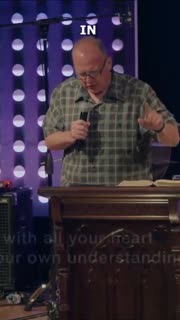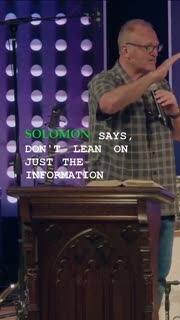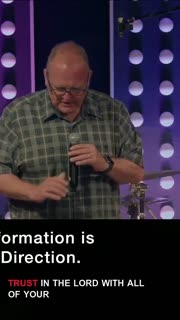Trusting God: Wisdom Beyond Our Understanding
Devotional
Sermon Summary
Bible Study Guide
Sermon Clips
1. "You took what the enemy made for evil, and you turned it into good with Ian, and lives are being changed. People are being transformed. The poor will be lifted up, and the gospel is going out, and people are coming to know Jesus, and that's because of you, the church. So it is an honor to be here. Yeah. Amen. Clap. Give God glory for it. It's His. It's His work." [01:45] (23 seconds)
2. "Well, in life, you all have decisions every day, some small, some life-altering. We all come to forks in the road. How do we know which way to go? Over the past few weeks, you guys have been doing a great series called Guidance, Making Wise Decisions. We've learned that God has a will for your life, and we need to follow his will." [04:43] (23 seconds)
3. "Trust in the Lord with all of your heart and lean not on your own understanding. In all your ways, submit to him and he will make your paths straight. Solomon's the one guy in the whole world who could have just said, when I've got a decision to make, when there's steps in front of me, when there's that fork in the road, I just rely. I just rely on all the information in my giant, big, fat head." [13:11] (29 seconds)
4. "When it comes to a decision, he says, trust in the Lord with all of your heart. Lean not on your own understanding. Acknowledge God in all your ways and he will make your paths straight. So let's just break that down a bit. Trust in the Lord. What's that mean? What's it mean to actually trust in the Lord? What's that look like?" [13:45] (19 seconds)
5. "Here's what trust in the Lord is. Jesus is holding the handles of the wheelbarrow and he looks at you and he says, if you trust me, get in the wheelbarrow and let me drive you wherever I want you to go. That's what you're supposed to go in your life. That's trust. That's trust. You know you're trusting God when you're allowing him to make decisions in your life." [15:08] (19 seconds)
6. "Solomon says, don't lean on just the information you've acquired. Information's good, but don't just make that it, your own understanding. Lean in on God. Prop yourself up on the Lord. When your information, your experience, your common sense conflicts with the Lord and his wisdom and his scripture, Solomon says, then go with the Lord. Don't go with your common sense, information, or experience, but when it's the Lord and his word speaking to you, go with the Lord." [16:06] (28 seconds)
7. "Trust God. Don't prop yourself up on your own information, your own understanding. Submit all your ways to Him, and the right path will get clear. The fog will lift. The promise is we'll get divine direction if we submit to Him. Divine direction comes through unconditional submission, not information. Let me just say that again. Divine direction comes through unconditional submission, not information." [18:23] (27 seconds)
8. "Trust in the Lord with all of your heart. Lean not on your own understanding. Acknowledge Him in all your ways. He'll make your path straight. Don't prop yourself up against your own wisdom. Solomon says, I'm the wisest guy who ever lived. I have all this vast knowledge that's been downloaded into me by God, but I've learned the secret of a path that leads to the good and godly destination, and it's this. Lean not on your own understanding." [19:02] (27 seconds)
9. "Trust God by leaning on his word. Start there. If you're going to learn somewhere to submit, submit to his word. Get this thing in you. I know through your small groups that you do, journaling, you study the word. If you don't know, you don't know where to start, you know, if you don't know something, go to Proverbs. Again, it's a chapter a day, you know, 31 of them. Read a chapter. Take the wisdom there. Submit to it." [25:01] (23 seconds)
10. "Trust God by leaning on his direction, not your intention. Let me just say it again. Trust God by leaning on his direction, not your intention. I started with the story where Christie and I are hiking. I didn't lean on the sign that pointed in the right direction. I leaned on my own gut, my own feeling. And I had every intention of taking a shortcut, but it wasn't shorter, was it? Didn't matter what my intention was. I was pointed in the wrong direction." [26:34] (31 seconds)
Ask a question about this sermon
2. "Well, in life, you all have decisions every day, some small, some life-altering. We all come to forks in the road. How do we know which way to go? Over the past few weeks, you guys have been doing a great series called Guidance, Making Wise Decisions. We've learned that God has a will for your life, and we need to follow his will." [04:43] (23 seconds)
3. "Trust in the Lord with all of your heart and lean not on your own understanding. In all your ways, submit to him and he will make your paths straight. Solomon's the one guy in the whole world who could have just said, when I've got a decision to make, when there's steps in front of me, when there's that fork in the road, I just rely. I just rely on all the information in my giant, big, fat head." [13:11] (29 seconds)
4. "When it comes to a decision, he says, trust in the Lord with all of your heart. Lean not on your own understanding. Acknowledge God in all your ways and he will make your paths straight. So let's just break that down a bit. Trust in the Lord. What's that mean? What's it mean to actually trust in the Lord? What's that look like?" [13:45] (19 seconds)
5. "Here's what trust in the Lord is. Jesus is holding the handles of the wheelbarrow and he looks at you and he says, if you trust me, get in the wheelbarrow and let me drive you wherever I want you to go. That's what you're supposed to go in your life. That's trust. That's trust. You know you're trusting God when you're allowing him to make decisions in your life." [15:08] (19 seconds)
6. "Solomon says, don't lean on just the information you've acquired. Information's good, but don't just make that it, your own understanding. Lean in on God. Prop yourself up on the Lord. When your information, your experience, your common sense conflicts with the Lord and his wisdom and his scripture, Solomon says, then go with the Lord. Don't go with your common sense, information, or experience, but when it's the Lord and his word speaking to you, go with the Lord." [16:06] (28 seconds)
7. "Trust God. Don't prop yourself up on your own information, your own understanding. Submit all your ways to Him, and the right path will get clear. The fog will lift. The promise is we'll get divine direction if we submit to Him. Divine direction comes through unconditional submission, not information. Let me just say that again. Divine direction comes through unconditional submission, not information." [18:23] (27 seconds)
8. "Trust in the Lord with all of your heart. Lean not on your own understanding. Acknowledge Him in all your ways. He'll make your path straight. Don't prop yourself up against your own wisdom. Solomon says, I'm the wisest guy who ever lived. I have all this vast knowledge that's been downloaded into me by God, but I've learned the secret of a path that leads to the good and godly destination, and it's this. Lean not on your own understanding." [19:02] (27 seconds)
9. "Trust God by leaning on his word. Start there. If you're going to learn somewhere to submit, submit to his word. Get this thing in you. I know through your small groups that you do, journaling, you study the word. If you don't know, you don't know where to start, you know, if you don't know something, go to Proverbs. Again, it's a chapter a day, you know, 31 of them. Read a chapter. Take the wisdom there. Submit to it." [25:01] (23 seconds)
10. "Trust God by leaning on his direction, not your intention. Let me just say it again. Trust God by leaning on his direction, not your intention. I started with the story where Christie and I are hiking. I didn't lean on the sign that pointed in the right direction. I leaned on my own gut, my own feeling. And I had every intention of taking a shortcut, but it wasn't shorter, was it? Didn't matter what my intention was. I was pointed in the wrong direction." [26:34] (31 seconds)










